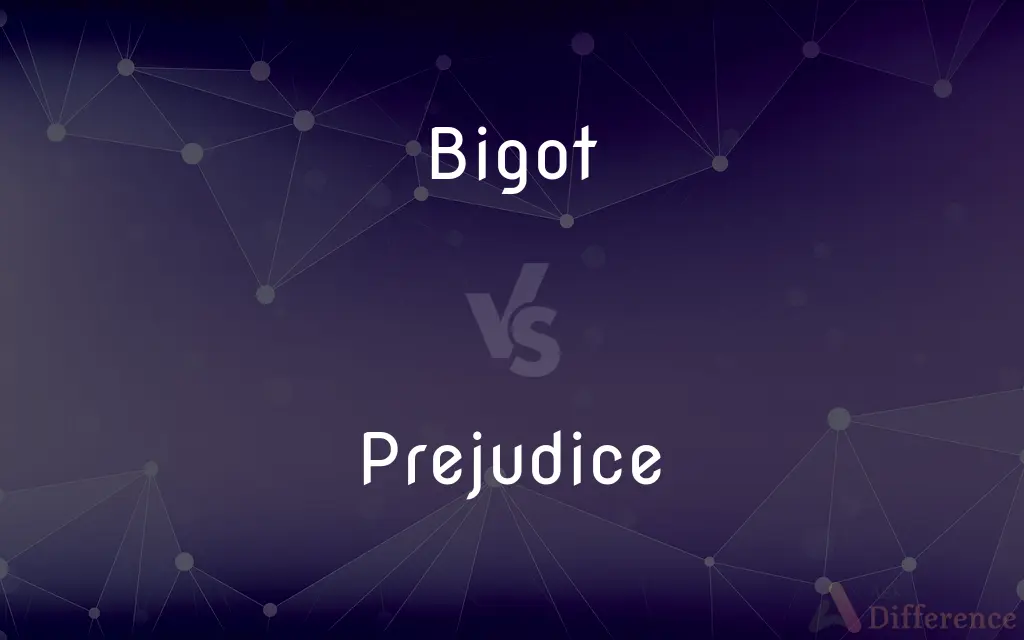Bigot vs. Prejudice — What's the Difference?

Difference Between Bigot and Prejudice
ADVERTISEMENT
Compare with Definitions
Bigot
One who is strongly partial to one's own group, religion, race, or politics and is intolerant of those who differ.
Prejudice
Prejudice can be an affective feeling towards a person based on their perceived group membership. The word is often used to refer to a preconceived (usually unfavourable) evaluation or classification of another person based on that person's perceived political affiliation, sex, gender, beliefs, values, social class, age, disability, religion, sexuality, race, ethnicity, language, nationality, complexion, beauty, height, occupation, wealth, education, criminality, sport-team affiliation, music tastes or other personal characteristics.The word "prejudice" can also refer to unfounded or pigeonholed beliefs and it may apply to "any unreasonable attitude that is unusually resistant to rational influence".
Bigot
One who is narrow-mindedly devoted to their own ideas and groups, and intolerant of (people of) differing ideas, races, genders, religions, politics, etc.
Prejudice
The act or state of holding unreasonable preconceived judgments or convictions
“This is not actually a volume of the best short stories … These are just the stories that I like best, and I am full of prejudice and strong opinions” (Ann Patchett).
Bigot
(obsolete) One who is overly pious in matters of religion, often hypocritically or else superstitiously so.
ADVERTISEMENT
Prejudice
An adverse judgment or opinion formed unfairly or without knowledge of the facts
A boy with a prejudice against unfamiliar foods.
Bigot
A hypocrite; esp., a superstitious hypocrite.
Prejudice
Irrational suspicion or hatred of a particular social group, such as a race or the adherents of a religion.
Bigot
A person who regards his own faith and views in matters of religion as unquestionably right, and any belief or opinion opposed to or differing from them as unreasonable or wicked. In an extended sense, a person who is intolerant of opinions which conflict with his own, as in politics or morals; one obstinately and blindly devoted to his own church, party, belief, or opinion.
To doubt, where bigots had been content to wonder and believe.
Prejudice
Detriment or harm caused to a person, especially in a legal case
The delay operated to her prejudice.
Bigot
Bigoted.
In a country more bigot than ours.
Prejudice
Preclusionary effect, preventing further pursuit of one's interests
The case was dismissed with prejudice.
Bigot
A prejudiced person who is intolerant of any opinions differing from his own
Prejudice
To fill with prejudice or cause to judge with prejudice
My rural upbringing has prejudiced me against living in the city.
Prejudice
To affect detrimentally or harmfully by a judgment or act
Negative media coverage prejudiced people's opinion of the mayor.
Prejudice
(countable) An adverse judgment or opinion formed beforehand or without knowledge of the facts.
Prejudice
(countable) A preconception, any preconceived opinion or feeling, whether positive or negative.
Prejudice
(countable) An irrational hostile attitude, fear or hatred towards a particular group, race or religion.
I am free of all prejudices. I hate everyone equally.
Prejudice
(obsolete) Knowledge formed in advance; foresight, presaging.
Prejudice
Mischief; hurt; damage; injury; detriment.
Prejudice
(transitive) To have a negative impact on (someone's position, chances etc.).
Prejudice
(transitive) To cause prejudice in; to bias the mind of.
Prejudice
Misspelling of prejudiced
Prejudice
Foresight.
Naught might hinder his quick prejudize.
Prejudice
An opinion or judgment formed without due examination; prejudgment; a leaning toward one side of a question from other considerations than those belonging to it; an unreasonable predilection for, or objection against, anything; especially, an opinion or leaning adverse to anything, without just grounds, or before sufficient knowledge.
Though often misled by prejudice and passion, he was emphatically an honest man.
Prejudice
A bias on the part of judge, juror, or witness which interferes with fairness of judgment.
Prejudice
Mischief; hurt; damage; injury; detriment.
England and France might, through their amity,Breed him some prejudice.
Prejudice
To cause to have prejudice; to prepossess with opinions formed without due knowledge or examination; to bias the mind of, by hasty and incorrect notions; to give an unreasonable bent to, as to one side or the other of a cause; as, to prejudice a critic or a juryman.
Suffer not any beloved study to prejudice your mind so far as to despise all other learning.
Prejudice
To obstruct or injure by prejudices, or by previous bias of the mind; hence, generally, to hurt; to damage; to injure; to impair; as, to prejudice a good cause.
Seek how may prejudice the foe.
Prejudice
A partiality that prevents objective consideration of an issue or situation
Prejudice
Disadvantage by prejudice
Prejudice
Influence (somebody's) opinion in advance
Share Your Discovery

Previous Comparison
Weaponise vs. Weaponize
Next Comparison
Cocktail vs. Highball














































